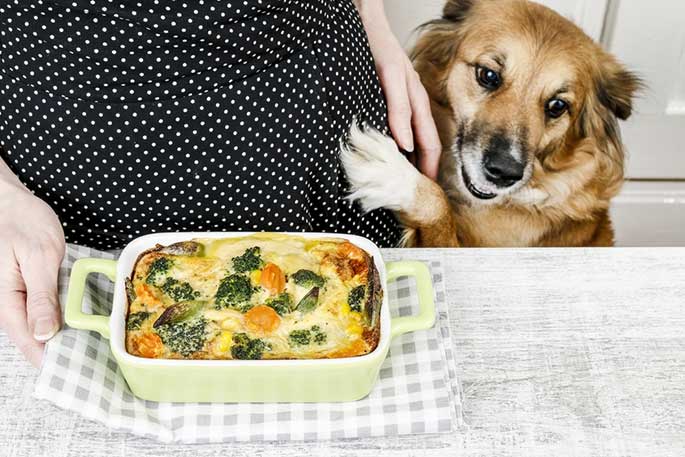
All animals need a balanced diet, and wholesome food is critical for the health of any dog. Many owners find it challenging to prepare a complete nutritional canine diet. The scarcity of information on fixing nutritious home-style dog food has made it seem tricky to cook for dogs, and some owners feel they don’t have time to explore ways to cook for a pet. After conducting extensive research, however, we are able to offer suggestions for conveniently preparing healthful, appetizing meals for a pet.
Although canines have distinct nutritional needs based on species, physique, maturity, and level of fitness, certain components should be present in every dog food preparation before it can be regarded as balanced. Essential components include:
Meat
A crucial protein source that may be beef, chicken, fish, rabbit, or other meat source. In every recipe we offer, meat is the main source of protein. Other protein sources, such as egg, should not be used as a substitute for meat. It’s important to follow our recipes carefully, because meat contains a certain amount of fat, potentially harmful to your dog’s health.
Grains
A source of energy, heat, carbon and hydrogen. If your canine isn’t allergic to grain, it could serve as an essential energy source in his diet. Oats, barley, rice, and peas are affordable, easily accessible, and digestible ingredients that should be in every balanced home-style dog food.
Minerals
Iron, zinc, calcium, potassium and manganese are essential for balanced home-style canine food. Minerals help maintain the dog’s skeletal structure, fluid balance, nerve function, muscle contraction, and cell performance.
Vitamins
Most dog owners know that vitamins are necessary in their pet’s diet. The challenge lies in identifying the amounts and types of vitamins the dog needs and how to regulate the dog’s intake of these dietary components. Plenty of vitamins are found in food, so you may not need to buy supplements to enhance your pet’s growth. We advise a visit with your vet if you have questions regarding vitamins in your dog’s diet.
Fat
Humans try to avoid immoderate consumption of fat as much as we can. However, fat isn’t bad for dogs when it is consumed in the right proportions. Fat is highly digestible, and it is an important source of energy for canines. When dogs consume fat, the animal’s digestive organs break down the fat and convert it to energy. A balanced portion of home-style dog food should contain 10-15% fat, found in chicken, beef, soy oil, pork, fish, and in many other sources.
Vegetables and fruit
A nonessential component in a basic dog meal, fruits and vegetables are included in a balanced portion of home-style dog food. Rich in minerals and vitamins, and low in calories and fiber, vegetables and fruit can serve as snacks for overweight dogs. Some vegetables, however, such as mushrooms, tomatoes, and onions, and fruits such as cherries, grapes, and avocado are dangerous to a dog’s health and should be avoided.
Water
Water is vital in a balanced portion of home-style dog food, keeping your canine hydrated and aiding digestion.
Home-style Canine Food and Skin Allergies
Allergies affect your dog’s health, and planning a home-style diet for canines with skin allergies can be a daunting task. Some dietary combinations may cause allergic reactions, and feeding your dog a balanced home-style diet is the best way to control these responses.



